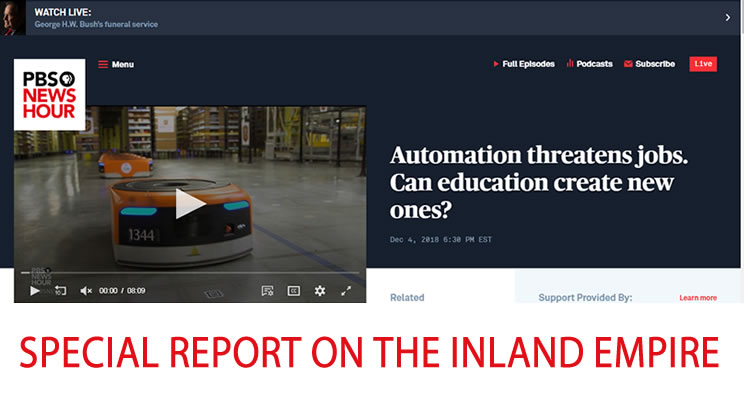Inland Empire Workforce Story Featured on PBS NewsHour
San Bernardino, CA – “Automation threatens jobs. Can education create new ones?” was the question of a PBS NewsHour report by reporter John Yang. Focusing on our Inland Empire region, Yang reports on how jobs and automation may threaten the Inland region’s workforce.
The report brought together Inland Empire stakeholders and experts to review what challenges our workforce and evolving automation trends are to the economy. John Yang’s report from the Inland Empire is part of a weekly education story on “Making the Grade.”
The report included major stakeholders in the Inland Empire:
- California State University, San Bernardino (CSUSB),
- The Spatial Economic Analysis and Regional Planning at the University of Redlands School of Business,
- Intech Center, a training center located on the campus of California Steel in Fontana,
- Inland Empire Economic Partnership (IEEP),
- and an overview of manufacturers and logistics companies, including Amazon.
Reporter John Yang started by setting the picture of the Inland Empire and the challenges the future represents, “Known as the Inland Empire, it’s home to about 4.5 million people, more than half of them Hispanic. Looming over the terrain of mountains and desert is the spread of automation, robotic machines performing simple repetitive tasks now performed by humans.
Johannes Moenius, Ph.D., of the University of Redlands stated, “It’s a very strange situation. We’re in the place where we have record low unemployment. The nation’s factories are humming. The logistics sector is booming. But this train can also run at high speed against a wall.”
- Dr. Moeniues cited two reports that can be viewed here: Future job automation to hit hardest in low wage metropolitan areas like Las Vegas, Orlando and Riverside-San Bernardino and Automation expected to disproportionately affect the less educated.
John Yang, “The numbers tell the story. Moenius’ research found that 63 percent of the jobs in the Inland Empire could be automated in the future.”
Paul Granillo of the IEEP stated, “Technology now turns over every 17 months. So if I’m trained on a machine, 17 months later, you’re going to have to retrain me because there’s going to be a new machine.”
John Yang. “Granillo is worried about automation’s effect on his region. He’s seen it triple the output of some area fulfillment centers with only double the number of workers.”
Sandra Sisco, Director of the Intech Center, “Somebody has to repair and maintain the robotic arms and anything that has to do with automation. So if you’re in the electrical and mechanical field, those are the core middle skills that you need to understand the next level.”
CSUSB Student, Erick Martinez stated, “If I can’t use my manual skills because a robot or an algorithm is going to take my job, what am I going to do?”
Enrique Murillo of CSUSB, “The competitive nature of the economy in the United States is going to depend heavily, as it is here in the Inland Empire, on the educational outcomes of Latinos.”
You can see the full 8 Minute Video here, https://www.pbs.org/newshour/show/automation-threatens-jobs-can-education-create-new-ones


